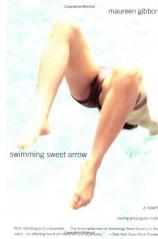Reading Group Guide
Discussion Questions
Swimming Sweet Arrow: A Novel

1. What are the forces that, in the absence of parental or other adult guidance, help Vangie determine the kind of person she wants to be? What fuels her frustration when, at the end of the novel, she tells her mother, "I don?t know whose life I want to have"?
2. None of Vangie?s jobs is very enviable, but she derives a strong sense of self and purpose from them. Why? What do Vangie?s jobs teach her about the world? About herself? Why is the most physically demanding job ? picking pears ? described in almost poetic terms?
3. Maureen Gibbon?s writing has been likened to that of Kate Chopin, Anaïs Nin, and Colette because of its frank exploration of female sexuality. What do Vangie and June have in common with the characters created by Chopin, Colette, and Nin? Why do you think sexu-ally forthright women characters in fiction continue to cause such a stir?
4. At the beginning of Chapter 2, Vangie states that there is a great deal "they never tell you about being a girl." How does this lack of information affect Vangie? Can Vangie gain the knowledge she seeks through means other than hard experience? Do girls today confront a comparable lack of access to information?
5. When Vangie reflects on June?s involvement with two brothers, she states that "none of us did anything for long unless we wanted to." What is Vangie saying here about choice? About self-knowledge? Are there other instances in the novel where Vangie seems to struggle to understand herself or her own role in an event?
6. What is the significance of Vangie?s dream of the owl at the end of chapter 17? How does her experience of this dream contrast with Del?s interpretation of the dream in chapter 24? Why does Vangie reject the religious devotion that seems to bring Del such comfort?
7. Del makes a valiant effort to rehabilitate himself after his overdose and seems to cleave to the principles of a twelve-step program. What undermines his efforts to change?
8. How would you characterize the relationship between Vangie and June? Why does Vangie turn away from June at the end of the book, at a moment when her friendship would have probably been particularly important to June? What does Vangie mean in chapter 25 when she says, "I could not keep letting [ June] touch me"?
9. After tremendous intimacy and friendship, Del and June are still "strangers" to Vangie, "all the more strange because I loved them," she says. What is Vangie saying here about the nature of love?
10. Although Vangie makes numerous missteps over the course of the novel, she also takes certain steps to expand her world and to increase the number of choices she has. Identify some of those steps. Is Vangie a character who is bound to be determined by her envi-ronment, or are there hints that she will go beyond the limited world of Mahanaqua?
11. The characters in Swimming Sweet Arrow seem to talk more easily about explicit sexual acts than about virtu-ally anything else. While the physicality of the sex in the novel cannot be denied, how does sex also serve as a metaphor in Swimming Sweet Arrow?
12. What is the role of the water imagery in the novel? Besides the title, where else does it occur?
13. Why is it important to Vangie to tell this story? Why does she struggle until she can say, ?There. Now it is all written down?
Swimming Sweet Arrow: A Novel
- Publication Date: August 8, 2001
- Paperback: 240 pages
- Publisher: Back Bay Books
- ISBN-10: 0316355569
- ISBN-13: 9780316355568







